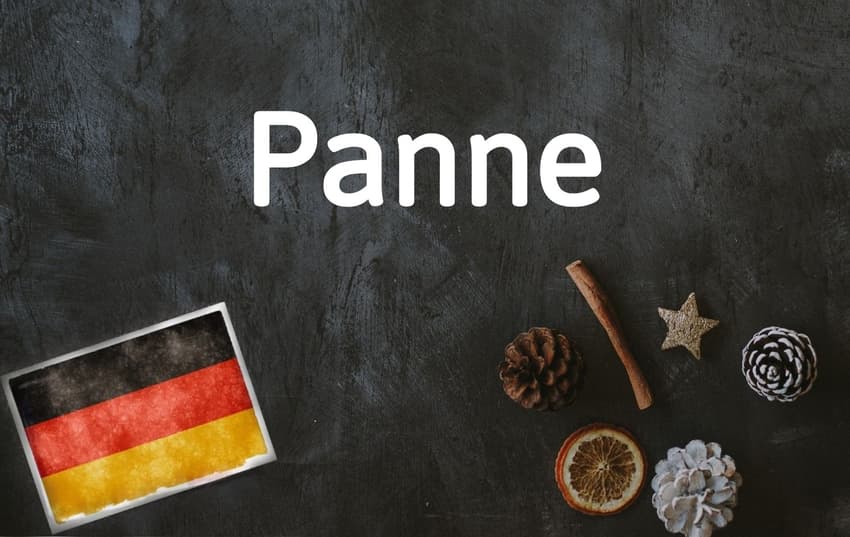German word of the day: Panne

This is good word to know if you're a driver - or Germany's Foreign Minister.
Why do I need to know Panne?
Because you may see it at the side of the road or, more recently, in the headlines of many German newspapers.
What does Panne mean?
die Panne translates to "breakdown", "mishap", or "malfunction" in English and it's most commonly used to describe an unexpected failure or problem in a mechanical or technical context.
For example, if a car suddenly stops running due to a mechanical issue, or if a machine or equipment fails to work properly it could be referred to as a Panne.
If you're driving on the Autobahn, you might see the word Panne on the side of the road, where it is used to signal the area intended for vehicles which have had a technical problem to stop. This "hard shoulder" is also sometimes referred to as Pannenstreifen (breakdown lane).
Recently, Germany's Foreign Minister was beset by a series of Pannen (breakdowns) and had to call off a foreign policy trip to the Pacific region after her government aircraft had two technical faults. The incident was referred to in many German media outlets as the Pannenflieger (the "malfunction aircraft").
In a broader sense, Panne can also be used to describe various kinds of mishaps or inconveniences in everyday life, not just limited to mechanical failures. For instance, a cooking mishap that results in burned food could be referred to as a Koch-Panne (cooking mishap), and a wardrobe malfunction might be called a Kleider-Panne (clothing mishap).
Where does Panne come from?
The term is borrowed from the French word panne shortened from rester en panne meaning "to get stuck, to come to a standstill"; in the original French, however, the word was used only in nautical language with the meaning "sail stop."
But the phrase soon became used in a broader context, in the figurative sense of being "in a tight spot."
Around 1900, the French term panne was adopted into the German language to refer to an operational disruption in vehicles or devices, meaning a technical breakdown.
Use it like this:
Mein Auto hatte heute Morgen eine Panne und konnte nicht starten.
My car had a breakdown this morning and couldn't start.
Die Veranstaltung lief reibungslos, es gab keine Pannen.
The event went smoothly, there were no mishaps.
Comments
See Also
Why do I need to know Panne?
Because you may see it at the side of the road or, more recently, in the headlines of many German newspapers.
What does Panne mean?
die Panne translates to "breakdown", "mishap", or "malfunction" in English and it's most commonly used to describe an unexpected failure or problem in a mechanical or technical context.
For example, if a car suddenly stops running due to a mechanical issue, or if a machine or equipment fails to work properly it could be referred to as a Panne.
If you're driving on the Autobahn, you might see the word Panne on the side of the road, where it is used to signal the area intended for vehicles which have had a technical problem to stop. This "hard shoulder" is also sometimes referred to as Pannenstreifen (breakdown lane).
Recently, Germany's Foreign Minister was beset by a series of Pannen (breakdowns) and had to call off a foreign policy trip to the Pacific region after her government aircraft had two technical faults. The incident was referred to in many German media outlets as the Pannenflieger (the "malfunction aircraft").
In a broader sense, Panne can also be used to describe various kinds of mishaps or inconveniences in everyday life, not just limited to mechanical failures. For instance, a cooking mishap that results in burned food could be referred to as a Koch-Panne (cooking mishap), and a wardrobe malfunction might be called a Kleider-Panne (clothing mishap).
Where does Panne come from?
The term is borrowed from the French word panne shortened from rester en panne meaning "to get stuck, to come to a standstill"; in the original French, however, the word was used only in nautical language with the meaning "sail stop."
But the phrase soon became used in a broader context, in the figurative sense of being "in a tight spot."
Around 1900, the French term panne was adopted into the German language to refer to an operational disruption in vehicles or devices, meaning a technical breakdown.
Use it like this:
Mein Auto hatte heute Morgen eine Panne und konnte nicht starten.
My car had a breakdown this morning and couldn't start.
Die Veranstaltung lief reibungslos, es gab keine Pannen.
The event went smoothly, there were no mishaps.
Join the conversation in our comments section below. Share your own views and experience and if you have a question or suggestion for our journalists then email us at [email protected].
Please keep comments civil, constructive and on topic – and make sure to read our terms of use before getting involved.
Please log in here to leave a comment.